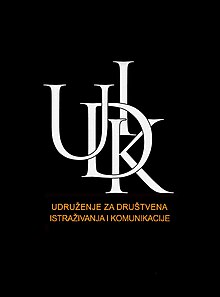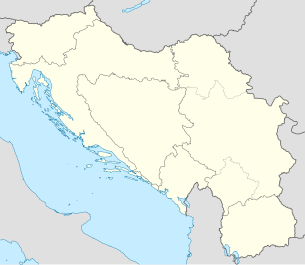UDIK
 | |
| Formation | October 2013 |
|---|---|
| Type | Non-governmental organization |
| Headquarters | Sarajevo, Bosnia and Herzegovina |
Region served | Bosnia and Herzegovina Croatia Montenegro Serbia |
| Services | Transitional justice |
Coordinator | Edvin Kanka Ćudić |
| Website | www.udik.org |
UDIK, the Association for Social Research and Communications (Bosnian: Udruženje za društvena istraživanja i komunikacije/ Удружење за друштвена истраживања и комуникације), is a Bosnian regional non-governmental organization with offices in Sarajevo and Brčko.[2][3][4][5] It was founded in 2013 by Edvin Kanka Ćudić that aimed to gather facts, documents, and data on genocide, war crimes, and human rights violations in Bosnia and Herzegovina and the former Yugoslavia.[6]
Human rights activities[]

UDIK was founded in 2013 by Edvin Kanka Ćudić. It aimed to gather facts, documents, and data on genocide, war crimes, and human rights violations in Bosnia and Herzegovina and former Yugoslavia.[7] UDIK works across national boundaries to assist post-conflict societies within the region reestablish the rule of law and deal with past human rights abuses. UDIK also implements a victim-oriented transitional justice programme with three principal components:[8]
- Documentation
- Justice and institutional reform
- Culture of remembrance
UDIK was made up of independent members, intellectuals and professionals from different academic disciplines.
Other activities[]
Since its inception, UDIK has supported the women's and LGBT rights.[9] Ćudić in several interviews said that the LBGT community, with the Romani people, is the most vulnerable community in Bosnia and Herzegovina. When the Bosnia and Herzegovina’s first Pride Parade was announced in 2019, UDIK immediately supported the parade.[10]
Activism[]
Commemorations[]


Since 2013, UDIK has organized a large number of commemorations to the victims of past war in the former Yugoslavia (1991-2001). UDIK calls this commemorations the Living monument. The ceremonies were organized in Bosnia and Herzegovina (Sarajevo, Tuzla, Brčko, Zenica, Višegrad, Foča), Croatia (Zagreb, Vukovar) and Serbia (Belgrade, Prijepolje).[13][14][15] Thanks to this initiative, for the first time, many commemorations were organized. These commemorations were related to crimes against civilian victims of Bosniaks, Serbs and Croats.
The activities that got the most attention were the commemoration of the non-Bosniak victims of the crimes committed in Sarajevo's Kazani and commemorations of Serbian victims of the crimes in Operation Storm organized in Sarajevo and Zagreb.
Allegations of bias[]
The criticism generally falls into the category of alleged bias, often in response to UDIK's commemorations to the Yugoslav wars victims. Bias allegations include the organization's insistence on war crimes on Serbs or Croats which was committed by the ARBiH. Bosniak right-wing media in Bosnia think that certain crimes against Serbs or Croats which was committed by the ARBiH were legitimate military targets against the aggressor while UDIK believes that Bosniaks must take responsibility for the killings of civilians in those crimes.[16][17][18]
Researches[]
Publications about war crimes[]

UDIK every year publishes documents about war crimes in Bosnia and Herzegovina. UDIK has published extensively on subjects such as war crimes, massacres and human rights violations from 1992 to 1995 in Foča, Višegrad, Sarajevo's Grbavica, Trusina, Sarajevo's Kazani, Sanski Most, Grabovica, Sijekovac, Vlasenica, Zaklopača, Biljani, Čajniče etc.[19][20] On the 25th anniversary of the Srebrenica genocide, UDIK published a book with the names of the buried victims of genocide from 2003 to 2019.[21]
UDIK's publications about war crimes in Bosnia and Herzegovina are available at the Library of Congress in United States.[22]
Central register of memorials[]
In December 2015, UDIK team began to research and compile a register of memorials for victims of the Yugoslav wars (1991-2001) including Albanians, Bosniaks, Croats, Montenegrins, Serbs and Others who were killed or disappeared during the armed conflicts in Yugoslavia (1991–2001) with the aim of creating the Central register of memorials on the territory of the former Socialist Federal Republic of Yugoslavia (SFRY) that would serve to curb attempts at historical revisionism and manipulative use of the numbers of victims.[23]
The register is based on analysis of documents from municipalities, cities, museums, tourist organizations, Islamic Community of Bosnia and Herzegovina, Serbian Orthodox Church, ministries of veterans including newspaper reports from the period, internet, publications, associations of veterans and families of the dead, etc.[24][25]
In 2016, UDIK published the first results of the Central rеgister of memorials for Bosnia and Herzegovina, listing more than 2.100 memorials to the victims of Bosnian War. Next year, UDIK also published more than 1.200 memorials built in Croatia dedicated to the victims of Homeland War.[26][27] In 2018 UDIK published more than 300 memorials build in Serbia (without Kosovo) and Montenegro dedicated to the victims of Serbia and Montenegro in Yugoslav wars. The registry also included memorials dedicated to the victims of NATO bombing of Serbia and Montenegro.[28]
The register also includes examples of the controversial memorials that were built after 1991 in the countries of the former Yugoslavia, and which glorify fascism and hatred among the people of the former Yugoslavia.[29][30]
The Central register of memorials of the Yugoslav wars is still the only register of memorials to victims of the Yugoslav wars on the territory of the countries of the former Yugoslavia.[31]
Advocacy[]
Campaings[]
Since 2014, UDIK has been advocating the construction of a monument to the victims killed at Sarajevo's Kazani. UDIK started this campaign as the first non-governmental organization which commemorated victims of this war crime. Commemorations was organised in front of the Sarajevo's Cathedral.[32][33] Since 2017, UDIK has been demanding that the City of Sarajevo build a monument to the victims of this crime in the Kazani and in the Sarajevo. This justified by the fact that Kazani is far from the Sarajevo, and that citizens for dealing with the past need monument in the city. In 2020, this UDIK's initiative was accepted and by other Bosnian and international organizations. A year later, same initiative was also accepted by intelectualls and representatives of the victims of this war crime.[34][35]
Cooperations[]

Since 2013, UDIK has been a member of the RECOM Reconciliation Network. The RECOM Reconciliation Network is a network of civil society organizations from post-Yugoslav countries which advocate for the establishment of RECOM – the Regional Commission tasked with establishing the facts about all Victims of war Crimes and other serious human rights violations committed on the territory of the former Yugoslavia from 1 January 1991 to 31 December 2001.[36]
Since 2014, UDIK has been cooperating with organizations from Croatia and Serbia in the campaign "The crimes in the Operation Storm are the responsibility of all of us" in commemorate Serbian victims of the crimes in Operation Storm in Croatia.[37][38][39] In May 2015, Federal Ministry of Interior of the Bosnia and Herzegovina banned the Sarajevo's commemoration of Serbian victims of the crimes committed in Operation Storm. In May 2016 the same commemoration was banned by Ministry of the Interior of the Republic of Croatia, but in the end it was held in Zagreb with high police security.[40]
In 2015, UDIK co-operated with the ICMP on the occasion of marking the International Day of the Disappeared, a commemoration designed to raise public awareness about the issue of missing persons from armed conflict and human rights abuses.[41]
In 2017, UDIK co-operated with the Sarajevo Film Festival in the Dealing with the Past program at the True Stories Market.[42]
In 2020, UDIK co-operated with the SENSE Transitional Justice Center and civil society organizations from Bosnia and Herzegovina, Croatia, Kosovo and Serbia in the campaign "Srebrenica 25: Together against the denial virus" to commemorate the 25th anniversary of the Srebrenica genocide.[43]
References[]
- ^ "Nacionalizam ubija, poručili aktivisti iz Sarajeva -Klix". www.klix.ba. 2013-11-09. Retrieved 2017-06-29.
- ^ "Performans ispred katedrale u znak sjećanja na Kazane, Odati počast svim žrtvama - Klix". klix.ba. 2015-10-25. Retrieved 2016-10-15.
- ^ "U BiH nakon rata podignuto 2500 spomenika - Al Jazeera Balkan". balkans.aljazeera.net. 2016-06-20. Retrieved 2016-10-15.
- ^ "Spomenici miru nisu u interesu bh. vlasti - Radio Slobodna Evropa". www.slobodnaevropa.org. 2016-08-27. Retrieved 2016-10-15.
- ^ "UDIK marks 23rd anniversary of kiling of civilians in Trusina near Konjic -Fena". www.fena.ba. 2016-04-15. Retrieved 2016-10-19.
- ^ "Da li je Srbija slobodna zemlja za ratne zločince". radioslobodnaevropa.org. 2017-06-18. Retrieved 2017-06-30.
- ^ "Da li je Srbija slobodna zemlja za ratne zločince". radioslobodnaevropa.org. 2017-06-18. Retrieved 2017-06-30.
- ^ "About us". udik.org. 2015-10-25. Retrieved 2017-07-03.
- ^ "Sarajevo: Ulična akcija "One su se borile za prava, a ne za karanfil"". klix.ba. 2015-03-07. Retrieved 2019-08-13.
- ^ ""Parada ponosa je potrebna. I za mene je degutantno vidjeti u Arabiji dva miliona žena u vrećama. SDA je Sarajevo napravilo konzervativnim"". source.ba. 2019-04-03. Retrieved 2019-08-13.
- ^ "Living monument". UDIK. 14 February 2014. Retrieved 14 February 2014.
- ^ "Nacionalizam ubija, poručili aktivisti iz Sarajeva -Klix". www.klix.ba. 2013-11-09. Retrieved 2017-06-29.
- ^ "UDIK odao počast žrtvama stradalim na Kazanima: Važno je sjećati se". informativa.ba. 2015-10-25. Retrieved 2017-07-03.
- ^ "Sjećanje na dan kada je ubijena tuzlanska mladost". nap.ba. 2015-05-25. Retrieved 2017-07-03.
- ^ "UDIK u Brčkom obilježio Dan bijelih traka". brcko.tv. 2016-05-30. Retrieved 2017-07-03.
- ^ "Kazani su povod bošnjačke pobjede". saff.ba. 22 August 2016. Retrieved 4 May 2017.
- ^ "Dva Srbina iz Kravice kao 8732 žrtve iz Srebrenice". novihorizonti.ba. 22 August 2016. Retrieved 4 May 2017.
- ^ "Zašto se UDIK nije sjetio žrtava Ahmića i Trusine na današnji dan?". opsadasarajeva.blogspot.ba. 22 August 2016. Retrieved 4 May 2017.
- ^ "Predstavljena knjiga o ratnom zločinu u Trusini". dnevni-list.ba. 2016-08-22. Retrieved 2016-10-15.
- ^ "Promovirana publikacije: Ratni zločini na Grbavici-presude". vijesti.ba. 2016-08-22. Retrieved 2016-10-15.
- ^ "UDIK objavio dvije publikacije povodom 25. godišnjice genocida". vijesti.ba. 2016-08-22. Retrieved 2016-10-15.
- ^ "LC Online Catalog - Library of Congress". catalog.loc.gov. 2016-08-22. Retrieved 2016-10-15.
- ^ "UDIK: U BiH izgrađeno je više od 2.100 spomenika koji su posvećeni borcima i civilima - novi.ba". novi.ba. 2016-08-22. Retrieved 2016-10-15.
- ^ "U BiH nakon rata podignuto 2500 spomenika – Al-Jazeera Balkans". balkans.aljazeera.net. 2016-08-22. Retrieved 2016-10-15.
- ^ "U Sarajevu predstavljanje Centralne evidencije spoemenika u BiH - vijesti.ba". vijesti.ba. 2016-08-22. Retrieved 2016-10-15.
- ^ "Ćudić:U RS ima 50 posto manje spomen obilježja nego u FBiH". fokus.ba. Retrieved 4 May 2017.
- ^ "Spomenici uglavnom ukazuju na patnju i stradanje samo jednog naroda". klix.ba. Retrieved 4 May 2017.
- ^ "U Srbiji 301 spomenik posvećen ratovima devedesetih i NATO bombardovanju". danas.rs. Retrieved 16 August 2019.
- ^ "Ćudić:U RS ima 50 posto manje spomen obilježja nego u FBiH". fokus.ba. Retrieved 4 May 2017.
- ^ "Spomenici uglavnom ukazuju na patnju i stradanje samo jednog naroda". klix.ba. Retrieved 4 May 2017.
- ^ "U BiH nakon rata podignuto 2500 spomenika – Al-Jazeera Balkans". balkans.aljazeera.net. 2016-08-22. Retrieved 2016-10-15.
- ^ "Članovi UDIK-a okupljeni u Sarajevu: Sjećanje na zločine počinjene na brdu Kazan". avaz.ba. 2014-10-25. Retrieved 2021-07-28.
- ^ "Sarajevska najpoznatija javnatajna, Civilno društvo, page 56" (PDF). fes.ba. 2021-06-14. Retrieved 2021-07-28.
- ^ "Slobodankino pismo gradonačelnici Sarajeva: Zar nije ljudski?". 6yka.com. 2021-06-14. Retrieved 2021-07-28.
- ^ "Otvoreno pismo gradonačelnici Sarajeva: Spomen-obilježje žrtvama Kazana treba biti u centru grada". bhrt.ba. 2021-06-14. Retrieved 2021-07-28.
- ^ "RECOM members". recom.info. 2016-08-22. Retrieved 2016-10-15.
- ^ "True Stories Market - Sarajevo Film Festival". sff.ba. 2016-08-22. Retrieved 2016-10-15.
- ^ "Sećanje na nevino stradale i proterane tokom akcije "Oluja"". subotica.com. 2016-08-22. Retrieved 2016-10-15.
- ^ "Državno organizirano poricanje zločina u Oluji i odgovornost svih nas". h-alter.org. 2016-08-22. Retrieved 2016-10-15.
- ^ "Tri osobe povrijeđene na protestu protiv veličanja Oluje u Zagrebu". rtrs.tv. 22 August 2016. Retrieved 4 May 2017.
- ^ "International Day of the Disappeared 2015". icmp.int. 2016-08-22. Retrieved 2016-10-15.
- ^ "True Stories Market - Sarajevo Film Festival". sff.ba. 2016-08-22. Retrieved 2016-10-15.
- ^ "Campaign Together against the denial virus". sensecentar.org. 2016-08-22. Retrieved 2016-10-15.
External links[]
- Official website
- (in English) Organisation Data TACSO
- (in English) Organisation Data Insight on Conflict
- (in English) Organisation Data Ana Lindh Foundation
- (in English) Organisation Data Transconflict
- Human rights organizations based in Bosnia and Herzegovina
- Organizations established in 2013
- Transitional justice
- Yugoslav Wars